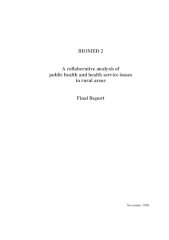
Aims and objectives: Overall aim of the project was to examine the evidence available on public health and health services in rural areas in European countries. Its specific objectives were: (1) To review the existing scientific knowledge of public health and health service issues including the impact of rurality on access to healthcare and workloads of general practitioners in rural areas; (2) to identify gaps in current knowledge and understanding; (3) to identify priorities for future research as the basis for the development of a programme of pan-European research and to develop an agenda for action on other identified priorities.
Methods: An extensive literature review and the desk research. The literature review included papers written in all the project partners’ main languages which are Danish, English, Finnish, Greek, Spanish and Portuguese. The desk research involved gathering data from the partners’ countries (Denmark, Finland, Greece, Ireland, Portugal, Spain and the UK) to provide a range of contextual information relevant to the project such as definitions of rurality, demographic characteristics of rural areas and information on recruitment/education of rural general practitioners.
Findings and recommendations: Examination of the evidence available showed that, although socio-economic conditions between countries varied, there were differences in the use of, and access to healthcare services in rural areas, compared with urban areas. Various alternatives such as mobile units and telemedicine have been tried to compensate for this, but their effectiveness has not been thoroughly proven. Extra funding for services in rural areas is available in some countries, but not all. Across the countries, rural general practices appeared to encounter similar problems. Although limited evidence was available, the problems included workloads, resources, and access to education and training. A lack of a consistent and robust definition of rurality, which makes the study results and statistical data difficult to interpret and therefore to compare, was identified. Overall, more research and data collection is needed with sensitivity to the diversity of rural communities. The research agenda for future pan-European research identified by this project includes research on the subject of a consistent definition of rurality, specific health indicators for rural areas, access barriers to rural health services and the nature and weight of rural doctors’ workload.